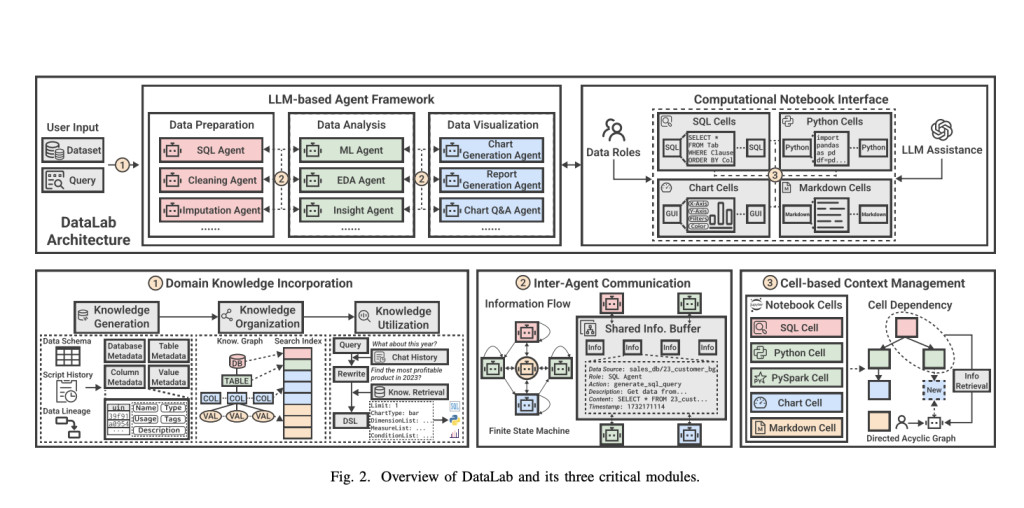

Business intelligence (BI) faces significant challenges in efficiently transforming large data volumes into actionable insights. Current workflows involve multiple complex stages, including data preparation, analysis, and visualization, which require extensive collaboration among data engineers, scientists, and analysts using diverse specialized tools. These processes are time-consuming and tedious, demanding significant manual intervention and coordination. The intricate interdependencies between professionals and tools slow the generation of insights, delaying decision-making and reducing organizational agility. These limitations underscore the critical need for more integrated and automated approaches to BI workflows.
Existing BI platforms tried to address workflow challenges through various approaches. Platforms like Tableau, Power BI, and Databricks have developed graphical user interfaces for data transformation and dashboard generation support. These platforms have integrated natural language interfaces to reduce manual operational burdens. Some research efforts have explored ontology-based methods to enhance semantic information and query interpretation capabilities. Previous studies have focused on specific data analysis scenarios, investigating how data analysts interact with LLMs and identifying challenges such as contextual data retrieval and prompt refinement. However, these existing solutions mainly target individual tasks but lack a detailed, unified approach to BI workflows.
Researchers from the State Key Lab of CAD&CG, Zhejiang University, Tencent Inc., Southern University of Science and Technology, and Peking University have proposed DataLab, a unified BI platform, that integrates a one-stop LLM-based agent framework with an augmented computational notebook interface. It supports a variety of BI tasks across different data roles by seamlessly combining LLM assistance with user customization within a single environment. DataLab overcomes the existing limitations of fragmented and task-specific BI tools. The method’s key innovation lies in its ability to create a holistic solution that bridges the gaps between various data roles, tasks, and tools, potentially revolutionizing how organizations approach data analysis and decision-making processes.
DataLab’s architecture is strategically designed around two primary components: the LLM-based Agent Framework and the Computational Notebook Interface. The LLM-based Agent Framework employs a complex multi-agent approach to handle diverse business intelligence tasks. Each agent is specifically crafted to address specific procedural requirements, utilizing a directed acyclic graph (DAG) structure that ensures flexibility and extensibility. The framework uses various data tools such as a Python sandbox for code execution and a VegaLite environment for visualization rendering. The architecture’s innovative design allows nodes to represent reusable components like LLM APIs and tools, while edges define interconnections between these components.
DataLab shows remarkable performance across various BI tasks, consistently outperforming state-of-the-art LLM-based baselines on multiple benchmarks including BIRD, DS-1000, DSEval, InsightBench, and VisEval. Its superior capabilities are driven by its innovative domain knowledge incorporation module and complex data profiling strategy. For symbolic language generation tasks such as NL2SQL, NL2DSCode, and NL2VIS, DataLab produces high-quality results by utilizing intermediate domain-specific language specifications. DataLab outperforms existing frameworks like AutoGen by up to 19.35% on some benchmarks in complex multi-step reasoning tasks. This shows the platform’s advanced data understanding capabilities and a structured inter-agent communication mechanism that facilitates detailed insight discovery.
In conclusion, researchers present DataLab, a unified BI platform that integrates an LLM-based agent framework with a computational notebook interface. The platform introduces innovative components, including a domain knowledge incorporation module, an inter-agent communication mechanism, and a cell-based context management strategy. These advanced features allow seamless integration of LLM assistance with user customization, addressing critical challenges in current BI workflows. By providing a detailed solution that supports diverse data roles and tasks, DataLab represents a significant advancement in automated data analysis. Extensive experimental evaluations validate the platform’s remarkable effectiveness and practical applicability in enterprise environments.
Check out the Paper. All credit for this research goes to the researchers of this project. Also, don’t forget to follow us on Twitter and join our Telegram Channel and LinkedIn Group. If you like our work, you will love our newsletter.. Don’t Forget to join our 60k+ ML SubReddit.
 [Must Attend Webinar]: ‘Transform proofs-of-concept into production-ready AI applications and agents’ (Promoted)
[Must Attend Webinar]: ‘Transform proofs-of-concept into production-ready AI applications and agents’ (Promoted)
The post Meet DataLab: A Unified Business Intelligence Platform Utilizing LLM-Based Agents and Computational Notebooks appeared first on MarkTechPost.
Source: Read MoreÂ

